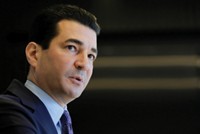Advertisement
Grab your lab coat. Let's get started
Welcome!
Welcome!
Create an account below to get 6 C&EN articles per month, receive newsletters and more - all free.
It seems this is your first time logging in online. Please enter the following information to continue.
As an ACS member you automatically get access to this site. All we need is few more details to create your reading experience.
Not you? Sign in with a different account.
Not you? Sign in with a different account.
ERROR 1
ERROR 1
ERROR 2
ERROR 2
ERROR 2
ERROR 2
ERROR 2
Password and Confirm password must match.
If you have an ACS member number, please enter it here so we can link this account to your membership. (optional)
ERROR 2
ACS values your privacy. By submitting your information, you are gaining access to C&EN and subscribing to our weekly newsletter. We use the information you provide to make your reading experience better, and we will never sell your data to third party members.
Business
FDA’s Gottlieb wants drug pricing and drug development costs to come down
The FDA aims to modernize data collection and evaluation of drug trials
by Ryan Cross
September 14, 2017
| A version of this story appeared in
Volume 95, Issue 37
The U.S. Food & Drug Administration wants to drive drug costs down—both the prices paid by patients and the increasingly expensive investments required during the early stages of drug development.
That’s the message FDA Commissioner Scott Gottlieb delivered at the Regulatory Affairs Professionals Society conference in Washington, D.C., on Sept. 11, calling the status quo “an unsustainable path.”
Gottlieb, a former fellow at the American Enterprise Institute, a conservative think tank, promised to encourage competition but also to target companies that “game our rules to extend their drug monopolies.”
Gottlieb declared that FDA has broad goals for modernizing data collection and evaluation of drug trials, which he surmised should help the industry save on drug development. But he also stated that such savings ought to be passed on to consumers.
New data collection techniques are increasingly being used in so-called seamless clinical trials, in which the three traditional trial phases are combined into a single, ongoing, and sometimes adaptive, study. The approach has already led to accelerated approval for cancer therapies.
Boosting FDA’s computing power is also on Gottlieb’s agenda. For instance, the agency is developing natural history models of rare diseases to improve small-sized trials. Researchers are also designing algorithms to objectively gauge lung tumors’ responses to treatment.
Bernard Munos, a senior fellow at the Milken Institute’s FasterCures research advocacy center, agrees with Gottlieb’s focus on drug development. “Changing the economics of drug R&D is priority number one,” he says. “I don’t think he’s trying to be nice or tough. I think he is trying to get work done.”





Join the conversation
Contact the reporter
Submit a Letter to the Editor for publication
Engage with us on Twitter